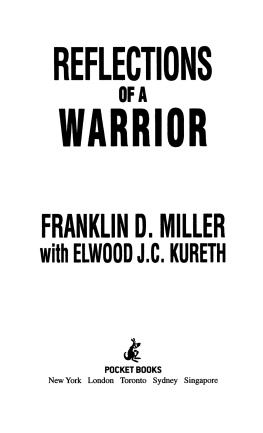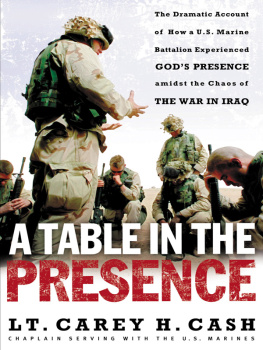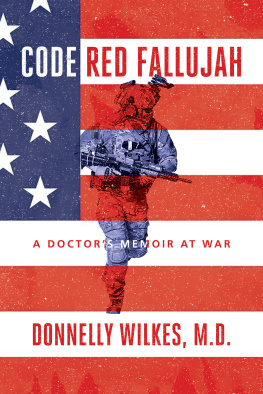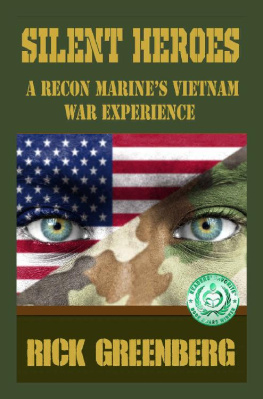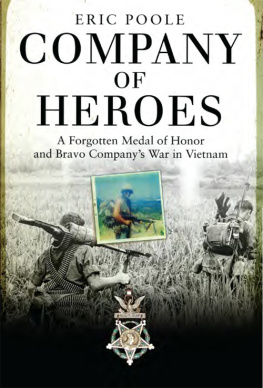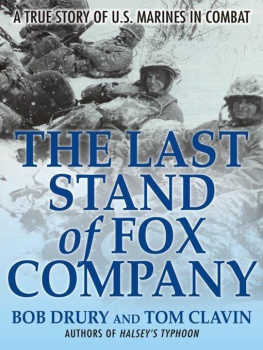An Original Publication of POCKET BOOKS
Copyright 2003 by Ray Hildreth and Charles W. Sasser
All rights reserved, including the right to reproduce this book or portions thereof in any form whatsoever.
For information address Pocket Books, 1230 Avenue of the Americas, New York, NY 10020
ISBN: 0-7434-6643-8
eISBN: 978-1-451-60430-6
First Pocket Books printing October 2003
10 9 8 7 6 5 4 3 2 1
POCKET and colophon are registered trademarks of Simon & Schuster, Inc.
Front cover photo by Robert Ellison, Under FireImages from Vietnam www.pieceuniquegallery.com ; back cover photo courtesy of the author
Manufactured in the United States of America
For information regarding special discounts for bulk purchases, please contact Simon & Schuster Special Sales at 1-800-456-6798 or business@simonandschuster.com.
This was an Alamowith survivors.
Marine officer after reading the
After Action reports from Hill 488
2330 HOURS
Richard Fitzpatrick, the corpsman on his first combat mission, got his right away. It seemed to Billy D. that everybody got hit at once during the grenade hailstorm and started hollering. A grenade struck Fitz in the face and bounced off before it exploded. Billy D. hurried over to him. He lay without moving. The flashing light from a mortar illuminated his face momentarily. Billy D. recoiled. He hardly recognized Fitz. The corpsmans face resembled raw hamburger. A Halloween horror mask with teeth glinting through the sides of his cheeks.
2333 HOURS
Bill Norman the Arizona cowboy worked near the northern front of the hill against the main assault. To him, an inveterate chess player and self-taught strategist, it seemed the knights and rooks and pawns suddenly came alive on the chessboard and were locked in a throat-to-throat struggle. Bullets ricocheted around him. Shrapnel whizzed. Tracers grazed overhead. There was lots of close shooting. Lots of everything. It was overwhelming.
Somebody hollered that hed been shot. A goddam ricochet!
Norman kept shooting into the night. If it movedif he thought it movedhe opened up.
This book is dedicated to the brave men of Hill 488, and to all the other men who have fought for their own hills.
CHARLES W. SASSER
This book is dedicated to the memories of my fallen comrades in arms. Also, my thanks to Mike Von Merveldt for planting the seed that eventually grew into this book.
RAY HILDRETH
My Soul, there is a country Far beyond the stars, Where stands a winged sentry All skillful in the wars.
HENRY VAUGHAN
Authors Note
This is a personal narrative of the events leading up to and occurring during the time period 13-16 June 1966 on Hill 488 in South Vietnam during the war. Actual names are used throughout the book except in those instances where names could not be recalled or where public identification would serve no useful purpose. Dialogue and scenes have by necessity been re-created in various instances. Where this occurs, we have tried to match personalities with the situation and action while maintaining factual content. The recounting of some events may not correspond precisely with the memories of all individuals concerned. (For example, there are large discrepancies in time periods, even among official records. Times used in this book are what most of those on the hill recall.)
Much time has passed since the events in this book occurred. Time has a tendency to erode memory in some areas and selectively enhance it in others. People may see the same events from different perspectives. Where errors in recollection occur, the authors accept full responsibility and ask to be forgiven.
The authors also apologize to anyone who may have been omitted, neglected, or slighted in the preparation of this book. While some interpretational mistakes are bound to have occurred, we are certain that the content of this book is true to the reality, spirit, and incredible courage of the brave men who fought and died on Nui Vu Hill that terrifying night of 15-16 June 1966, Republic of South Vietnam.
Introduction
In the East Room of the White House on 21 August 1967, Gunnery Sergeant Jimmie Earl Howard stood proudly at attention while President Lyndon B. Johnson placed the blue-starred Congressional Medal of Honor around his neck. He was the sixth U.S. Marine to win the nations highest award for valor during the Vietnam war.
President Johnson praised Howard as a professional Marine who was typical of the men who endure the savage heat of battle abroad so that their countrymen may walk in peace here at home.
With tears in his eyes, the grizzled Marine with short-cropped, prematurely graying hair stepped to the microphone to accept the honor and to give credit to the fifteen Marines and two Navy corpsmen who, with him, defended Hill 488 against an estimated 400 to 450 well-disciplined North Vietnamese Army regulars and Viet Cong Main Force guerrillas throughout a terror-filled night in June 1966. He began to speak in a hesitant voice.
I dont know how to speak, gentlemen, he said, but I want to say in all sincerity His voice wavered and broke. He finally waved a hand at the survivors of that unbelievable night of horror and courage who were all present for the ceremony. Thats the guys who did it right there.
The medal belonged as much to them, he said, as to himself. He took the President by the hand and personally introduced him to each man who lived through that most improbable battle of modern warfare.
The defense of Hill 488, also called Nui Vu Hill, was certainly about individual courage. Men like Howard endured the bitter winter at Valley Forge, stormed the Normandy beaches, fought alongside John F. Kennedy in the Pacific. They faced aggression on the frozen hills of Korea and manned lonely fire bases in Vietnam.
But Hill 488 was also something more than individual courage. If the action had centered around only the one man, it might have been considered a unique incident of exceptional bravery by an exceptional man. As it turned out, however, Uncommon Valor Was a Common Virtue that surmounted the courage of any single individual. That phrase is inscribed on the U.S. Marine Corps War Memorial in Arlington, Virginia, spoken by Admiral Chester Nimitz to describe the heroism of those who fought on Iwo Jima during World War II. It is a maxim that certainly applies to the members of Howards platoon.
First Platoon of Charlie Company, First Reconnaissance Battalion, First Marine Division, became the most highly decorated unit of its size in the entire history of the United States military. Decorations included: the Medal of Honor; four Navy Crosses, the nations second highest award for valor; thirteen Silver Stars, the third highest valor awards; and eighteen Purple Hearts. Every man on the hill was either killed or wounded.
Few would have noticed anything unique or particularly special about First Platoon before the night of 15-16 June 1966. The men of the platoon were a sampling from places all over the nationNew York, California, Tennessee, New Mexico, Kansas, Texas, Oklahoma. Even though they had been selected and trained for reconnaissance and four were trained snipers, they were in most respects typical American young men, most of whom were recently still in high school. They were an average lot, country and city boys, who underwent the seemingly magical training process by which green recruits become United States Marines.
Perhaps this training was their great strength. It allowed them to rise above normal expectations to fight one of the truly great stands in all of history. As one Marine officer stated after studying the After Action reports, This was an Alamowith survivors.


